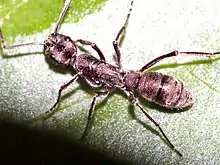Diacamma
Diacamma is a genus of queenless ants belonging to the subfamily Ponerinae.[2] It is distributed from India to Australia and contains about 24 species.[3]
| Diacamma | |
|---|---|
 | |
| Diacamma rugosum | |
| Scientific classification | |
| Domain: | Eukaryota |
| Kingdom: | Animalia |
| Phylum: | Arthropoda |
| Class: | Insecta |
| Order: | Hymenoptera |
| Family: | Formicidae |
| Subfamily: | Ponerinae |
| Tribe: | Ponerini |
| Genus: | Diacamma Mayr, 1862 |
| Type species | |
| Ponera rugosa Le Guillou, 1842 | |
| Diversity[1] | |
| 24 species[1] | |
Biology
A queen caste does not exist in Diacamma. Unique to this genus, all workers emerge from cocoons with a pair of tiny innervated thoracic appendages (gemmae) that are homologous with wings. Mutilation leads to a permanent change in lifetime trajectory, because workers lacking gemmae never mate. This is unlike other queenless ants where workers establish a dominance hierarchy to regulate reproduction. In Diacamma only one worker retains her gemmae in each colony, she is the gamergate (mated egglaying worker), and she bites off the gemmae of newly emerged workers. Mutilation causes the degeneration of the neuronal connections between the sensory hairs on the gemma's surface and the central nervous system, and this may explain the irreversibility of modifications in individual behaviour.[2]
Species
- Diacamma assamense Emery, 1897
- Diacamma australe (Fabricius, 1775)
- Diacamma baguiense Wheeler & Chapman, 1925
- Diacamma bispinosum (Le Guillou, 1842)
- Diacamma ceylonense Emery, 1897
- Diacamma colosseense Forel, 1915
- Diacamma cupreum (Smith, 1860)
- Diacamma cyaneiventre André, 1887
- Diacamma holosericeum (Roger, 1860)
- Diacamma indicum Santschi, 1920
- Diacamma intricatum (Smith, 1857)
- Diacamma jacobsoni Forel, 1912
- Diacamma leve Crawley, 1915
- Diacamma longitudinale Emery, 1889
- Diacamma palawanicum Emery, 1900
- Diacamma pallidum (Smith, 1858)
- Diacamma panayense Wheeler & Chapman, 1925
- Diacamma purpureum (Smith, 1863)
- Diacamma rugivertex Emery, 1902
- Diacamma rugosum (Le Guillou, 1842)
- Diacamma scalpratum (Smith, 1858)
- Diacamma schoedli Shattuck & Barnett, 2006
- Diacamma sericeiventre Stitz, 1925
References
- Bolton, B. (2014). "Diacamma". AntCat. Retrieved 3 July 2014.
- "Genus: Diacamma". antweb.org. AntWeb. Retrieved 11 October 2013.
- Schmidt, C. A; Shattuck, S. O. (2014). "The Higher Classification of the Ant Subfamily Ponerinae (Hymenoptera: Formicidae), with a Review of Ponerine Ecology and Behavior". Zootaxa. 3817 (1): 1–242. doi:10.11646/zootaxa.3817.1.1. PMID 24943802.
 This article incorporates text from a scholarly publication published under a copyright license that allows anyone to reuse, revise, remix and redistribute the materials in any form for any purpose: "Genus: Diacamma". antweb.org. AntWeb. Retrieved 11 October 2013. Please check the source for the exact licensing terms.
This article incorporates text from a scholarly publication published under a copyright license that allows anyone to reuse, revise, remix and redistribute the materials in any form for any purpose: "Genus: Diacamma". antweb.org. AntWeb. Retrieved 11 October 2013. Please check the source for the exact licensing terms.
External links
 Media related to Diacamma at Wikimedia Commons
Media related to Diacamma at Wikimedia Commons- Diacamma photo gallery by Alexander Wild